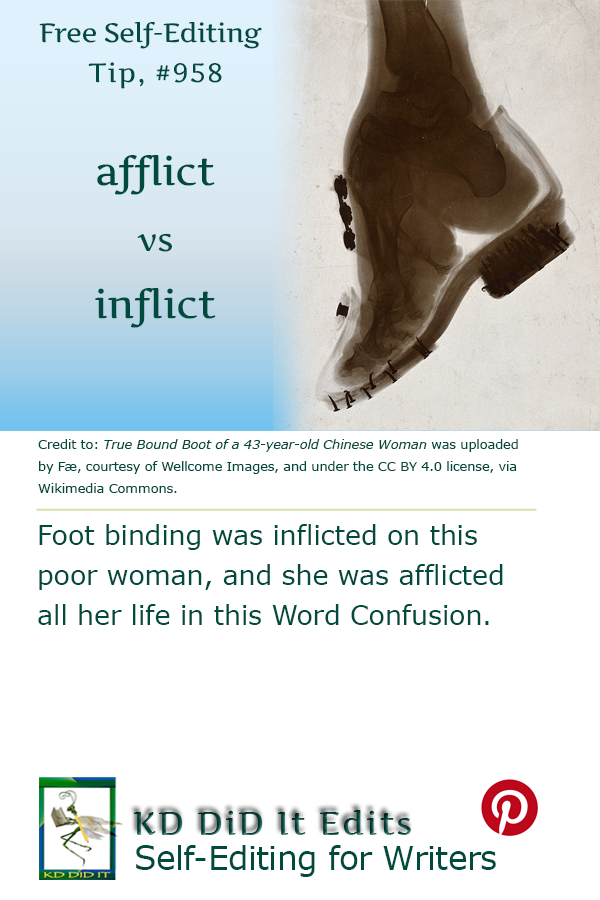Both afflict and inflict are about the pain.
Only afflict causes someone to suffer or be unhappy, commonly due to a disease.
Inflict is nastier as it is caused by someone forcing pain and suffering on another person.
Hmmm, sounds like those word confusions inflicted on me when a writer isn’t paying attention. It’s an affliction on me, that’s for sure . . . *laughing*.
Word Confusions . . .
. . . started as my way of dealing with a professional frustration with properly spelled words that were out of context in manuscripts I was editing as well as books I was reviewing. It evolved into a sharing of information with y’all. I’m hoping you’ll share with us words that have been a bête noire for you from either end.
If you found this post on “Afflict versus Inflict” interesting, consider subscribing to KD Did It, if you’d like to track this post for future updates.
| Afflict | Inflict |
|---|---|
 — |
 |
| Part of Grammar: | |
| Verb, transitive
Third person present verb: afflicts |
Verb, transitive
Third person present verb: inflicts |
| Verb, transitive: [Of a problem or illness] Cause pain or suffering to
[Obsolete] To overthrow
[Obsolete] To humble |
Verb, transitive: Cause (something unpleasant or painful) to be suffered by someone or something
To deal or deliver, as a blow, lashes, etc. |
| Examples: | |
| Verb, transitive: His younger child was afflicted with a skin disease. Depression is a tricky disease to treat, in part because it manifests so differently in those it afflicts. Serious ills afflict the industry. Jupiter is afflicted by Mars in opposition. She’s afflicted with arthritis. “When their substance is drained away, the peasantry will be afflicted by heavy exactions.” – Sun Tzu, The Art of War. |
Verb, transitive: They inflicted serious injuries on three other men. There is so much damage being inflicted on industries by the recession. She is wrong to inflict her beliefs on everyone else. Dad will inflict punishment when he gets home. The regime inflicted burdensome taxes on the people. |
| Derivatives: | |
| Adjective: afflictive Adverb: afflictively Noun: afflictedness, afflicter, afflicting Noun, plural: the afflicted |
Adjective: inflictable, inflictive Noun: inflicter, inflicting, infliction, inflictor |
| History of the Word: | |
| Late Middle English, in the sense deject, humiliat, from the Latin afflictare meaning knock about, harass’, or from afflict- meaning knocked down, weakened; both from the verb affligere, from ad- (to) + fligere (to strike, dash). | Mid-16th century, in the sense afflict, trouble, from the Latin inflict- meaning struck against, from the verb infligere, which is from in- (into) + fligere (to strike). |
C’mon, get it out of your system, bitch, whine, moan . . . which words are your pet peeves? Also, please note that I try to be as accurate as I can, but mistakes happen or I miss something. Email me if you find errors, so I can fix them . . . and we’ll all benefit!
Satisfy your curiosity about other Word Confusions on its homepage or more generally explore the index of self-editing posts. You may also want to explore Book Layout & Formatting Ideas, Formatting Tips, Grammar Explanations, Linguistics, Publishing Tips, the Properly Punctuated, Writing Ideas and Resources, and Working Your Website.
Resources for Afflict versus Inflict
Apple Dictionary.com
Dictionary.com: afflict; inflict
Pinterest Photo Credits:
True Bound Boot of a 43-year-old Chinese Woman was uploaded by Fæ, courtesy of Wellcome Images, and under the under the CC BY 4.0 license, via Wikimedia Commons.


